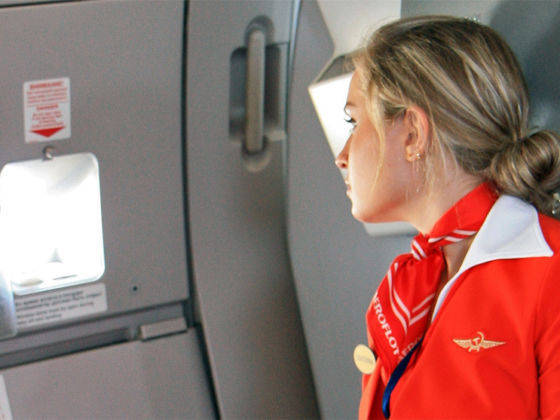Unless you live right across the street from your workplace or work from home in your jammies, you probably embark on some sort of daily commute to get to and from your job. You might jam out to T-Swizzle on your drive, scroll through cat memes on the train, or use your bus ride to get lost in a new novel. But when flight attendants and pilots talk about commuting, it’s a different story.

When we say “commute,” we don’t mean the act of getting to the airport. Not all flight attendants live in the city they’re based out of. Instead, when we say “commute,” we’re talking about the flight or flights it takes to get from where we live to the base from which our work trips originate.
Flight attendants add at least two legs to the entire trip — one to get to work and one to return home. We don’t have to pay for these flights to and from work — but we fly standby, which means that we are not guaranteed a spot on that plane. If a paying customer doesn’t buy the seat, we get to go to work/home. This type of commute adds a level of stress to the job that simply isn’t there when you’re based where you live. And yet, you’ll meet many flight attendants who choose to live this way.
As far as commutes go, mine is actually pretty simple. I live in St. Louis and commute to Chicago — a flight time of only about 40 minutes. So far, I’ve lucked out and always got on my commuter flight on the first try. This isn’t always the norm — I know flight attendants who have been reduced to tears when they realized there was no way they’d get home that night. Some end up taking connecting flights to another airport closer to where they need to go only to get stuck there or get roped into renting a car for a 14-hour drive. As far as not being able to get to work, flight attendants at most American airlines have union contracts to protect them from discipline regarding their commute.
Commuting as a reserve flight attendant is even more interesting than commuting as a line-holder who has a monthly schedule of flights. Since I’m on call, I don’t know where I’m going or even if I’m going anywhere once I get to Chicago. I just need to be there and be prepared to get to the airport with as little as two hours’ notice. I personally stay with friends in the city during my reserve days until I get called. Other flight attendants use crash pads, which are run out of apartments or hotels specifically for airline crew to crash between trips.
Here’s an example of how commuting goes for a reserve flight attendant like myself:
I woke up at 4:30 AM on a Wednesday to get to the airport for an early flight to Chicago — the earlier the better because people are more likely to oversleep and miss their flights… your loss is my gain as a commuter. I got to Chicago at around 9 AM and made my way by train to my friend’s house. I started my reserve period at 2 PM and lounged around until I got the call for a four-day trip around 3:30 PM. I proceeded back to the airport and had a layover in Orlando before two more nights in Houston. I got back to Chicago on Saturday just in time to unwind and hang out with my hosts. Crew Scheduling decided to leave me alone for my final two days of reserve, so I headed back to St. Louis late Monday afternoon with five days off to look forward to.
My version of flight attendant life didn’t always look like this. When I first started, I lived in Chicago. If Crew Scheduling didn’t call me, I simply went about my day at home. I could sleep in however long I wanted until my reserve period started at 2 PM. When I finished a trip, I went home — not just back to a friend’s house. I love being able to catch up with my Chicago friends, but that does not replace the comforts of home after being away. The only reason I switched cities is because my partner lives in St. Louis.
But an extra 40-minute flight and a creative part-time living situation are small prices to pay for living life the way I want to, where I want to do it. Flight attendants are awarded the rare freedom to live wherever they want. And while I am away for the six-day stretches I’m on call, I’m also completely off with no job responsibilities for four or five days when I return. In a way, I actually have more time to spend with my significant other than someone who works a 9-5 gig with a two-day weekend. Sure, you could be dismal and say I’m gone half the month, but I really don’t see it that way. On average, I have 12-13 days at home a month to pack with adventures. I wouldn’t trade it for anything.
Next time you’re feeling antsy about your hour-long train ride to work, remember the flight attendant who commutes from a rural Wyoming ranch to Los Angeles. Or the one who drives four hours from Ontario to Detroit several times a month. Or my personal favorite — the flight attendant who makes the two-leg journey from Medellín, Colombia, to Fort Lauderdale and then Chicago.